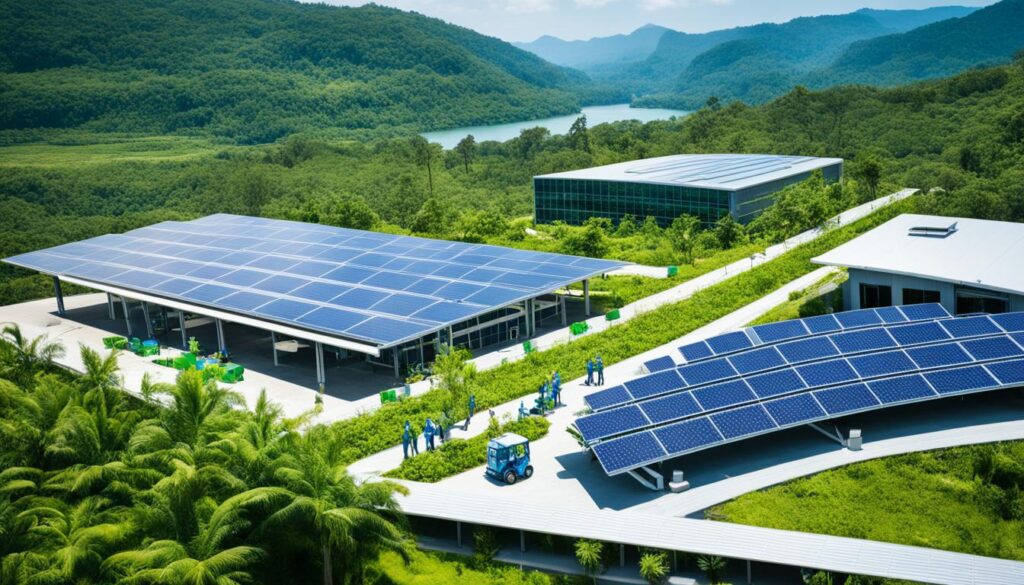Imagine strolling through a bustling city street, the warm sun on your face and a gentle breeze rustling your hair. As you glance around, you can’t help but notice the vibrant colors and stylish outfits adorning the people passing by. However, what catches your eye isn’t just the fashion-forward designs but the conscious choices made by these individuals to embrace green chic – the latest trend in eco-friendly fashion.
Green chic is more than just a passing fad; it’s a movement that is reshaping the fashion industry. People are increasingly aware of the environmental impact of fast fashion and are choosing to make a change. Sustainable materials like organic cotton, bamboo, and recycled polyester are becoming the fabric of choice, with brands adopting eco-friendly practices and ethical supply chains.
But what does it mean to be green chic? It means wearing clothes that make a positive impact on the planet without compromising style. It means supporting brands that prioritize ethical manufacturing processes and promote transparency. And it means embracing the slow fashion movement, which encourages us to invest in quality pieces that stand the test of time.
Get ready to dive into the world of eco-friendly fashion trends that await us in 2023. From innovative textiles to ethical supply chains and the rise of the slow fashion movement, this article will explore the exciting developments in sustainable fashion and how they are shaping a greener future for the industry.
Key Takeaways:
- Green chic is the emerging trend in eco-friendly fashion.
- Eco-friendly materials like organic cotton, bamboo, and recycled polyester are gaining popularity.
- Brands are adopting sustainable practices and prioritizing transparency.
- The slow fashion movement promotes quality over quantity and garment longevity.
- Eco-friendly fashion in 2023 promises a stylish and conscious lifestyle.
Evolving Trends in Sustainable Fashion
Sustainable fashion is reshaping the industry, placing a strong emphasis on eco-friendly materials, ethical supply chains, and the slow fashion movement. Consumer awareness, government regulations, and the urgent need for change have all played a significant role in driving the popularity of sustainable practices and materials.
The use of **eco-friendly materials** like organic cotton, bamboo, and recycled polyester has gained traction due to their positive environmental impact. These materials require fewer resources during production and have a lower carbon footprint compared to traditional textiles. Consumers are increasingly drawn to brands that prioritize **sustainable fashion** and use eco-friendly materials, driving demand for green products in the market.
In response to this growing demand, many fashion brands are actively incorporating **eco-friendly materials** into their collections. **Sustainable fashion** not only reduces the environmental impact of the industry but also helps create a more responsible and transparent supply chain. By prioritizing the use of organic cotton, bamboo, and recycled polyester, brands are taking a significant step towards building a more sustainable future for fashion.
Transparency has become a crucial aspect of sustainable fashion. Brands are now focusing on communicating their sustainability initiatives and manufacturing processes to consumers. **Eco-friendly materials** are not the only key consideration for sustainable fashion; ethical supply chains also play a vital role. Consumers want to know that the clothes they purchase are ethically produced and that workers are treated fairly. As a result, brands are implementing strict guidelines and working towards establishing transparent supply chains.
“Sustainable fashion is an evolving movement that values the environment, worker well-being, and ethical practices. By adopting **eco-friendly materials** and establishing ethical supply chains, the fashion industry is beginning to respond to the growing need for sustainable options.”
New Fashion Brands Making a Difference
Several emerging fashion brands are leading the way with their commitment to sustainable practices and the use of **eco-friendly materials**. One notable example is Patagonia, a renowned outdoor apparel company that emphasizes durability and repairability in their products. They have embraced **sustainable fashion** by using recycled materials in their garments and actively promoting recycling and second-hand sales.
Another brand making waves in the sustainable fashion scene is Reformation. They focus on eco-friendly materials and sustainable production processes, offering stylish and ethically conscious clothing. Reformation also places a strong emphasis on transparency, providing detailed information about the environmental impact of their products on their website.
These brands, among many others, are leading the charge towards a more sustainable and eco-friendly fashion industry. By integrating **eco-friendly materials** and investing in ethical supply chains, they inspire consumers and motivate other brands to follow suit.
| Key Trends in Sustainable Fashion | Impact |
|---|---|
| Emphasis on eco-friendly materials | Reduced environmental impact |
| Investment in ethical supply chains | Fair treatment of workers and improved working conditions |
| Promotion of the slow fashion movement | Reduction of waste and consumer education |
| Transparency in manufacturing processes | Increased consumer trust and informed purchasing decisions |
Eco-Friendly Textiles
Brands today are recognizing the importance of sustainable practices in the fashion industry. One key aspect of this movement is the increased use of eco-friendly textiles. Organic cotton, bamboo, and recycled polyester are just a few examples of sustainable materials that are making a significant impact.
By utilizing these eco-friendly textiles, brands can establish greener manufacturing processes and reduce the industry’s environmental and social footprint. Organic cotton, for instance, is grown without harmful pesticides and chemicals, making it a safer and more sustainable alternative to conventional cotton.
Another success story in the realm of sustainable textiles is H&M’s Garment Recycling Program. This initiative collects thousands of unwanted garments from consumers and transforms them into new pieces, reducing textile waste and promoting a circular economy. In fact, H&M’s program collected enough fabric in 2019 to manufacture millions of t-shirts, further demonstrating the potential of sustainable fashion.
The use of sustainable materials not only benefits the environment but also promotes ethical and responsible practices. By opting for recycled polyester over virgin polyester, brands can minimize the consumption of natural resources and decrease dependence on fossil fuels.
Overall, the integration of eco-friendly textiles is a significant step towards achieving sustainability in the fashion industry. Brands that embrace these materials not only contribute to a greener future but also cater to the growing demand for more conscious and environmentally responsible fashion choices.
The Benefits of Eco-Friendly Textiles:
- Reduced dependence on harmful pesticides and chemicals
- Diminished environmental impact through the use of recycled materials
- Promotion of a circular economy through textile recycling initiatives
- Minimized consumption of natural resources and decreased reliance on fossil fuels
- Catering to the growing demand for sustainable and ethical fashion alternatives
“The use of eco-friendly textiles is a crucial step towards achieving a more sustainable fashion industry. By embracing these materials, brands can reduce their environmental impact and meet the demand for ethical and responsible fashion choices.”
Ethical Supply Chains
Ethical supply chains are essential for the sustainability of the fashion industry. By prioritizing fair labor practices, safe working conditions, and environmental responsibility, brands can contribute to a more equitable and environmentally conscious future.
One way to make the fashion supply chain more sustainable is by recycling fabrics. By repurposing materials, brands can reduce waste and minimize their environmental impact. Additionally, recycling fabrics helps to conserve resources and reduce the need for new raw materials.

Another innovative approach to promoting ethical supply chains is through the use of bioengineered dyeing techniques. Traditional dyeing processes often involve harmful chemicals that are harmful to the environment and pose risks to the health of garment workers. By utilizing bacteria-based dye technology, brands like Colorifix are able to create vibrant dyes without the use of harmful chemicals, thereby reducing water and energy consumption in the fashion industry.
By embracing ethical supply chains and fair labor practices, the fashion industry can move towards a more sustainable and socially responsible future. Consumers are increasingly demanding transparency and socially conscious practices from the brands they support, making this a crucial aspect of sustainable fashion.
Slow Fashion Movement
The slow fashion movement is gaining momentum in the fashion industry, driven by a desire for sustainable and ethical practices. Unlike fast fashion, which focuses on producing cheap, disposable clothing at a rapid pace, the slow fashion movement promotes quality over quantity and values the longevity of garments.
By encouraging consumers to invest in long-lasting, timeless pieces, the slow fashion movement aims to reduce waste and promote a more sustainable approach to fashion consumption. Rather than constantly buying new clothes, conscious consumers are encouraged to build a versatile and durable wardrobe that can withstand changing trends.
Emphasizing garment longevity is a key principle of the slow fashion movement. It involves choosing clothes made from high-quality materials and crafted with impeccable attention to detail. These garments are designed to withstand the test of time, both in terms of style and durability.
“Investing in a high-quality garment may initially seem more expensive, but in the long run, it saves money. These pieces are made to last, reducing the need for frequent replacements.”
By opting for garments with longevity, consumers can create a sustainable and responsible fashion cycle. They reduce the demand for fast fashion items that contribute to environmental degradation and exploitative labor practices. Additionally, buying fewer but better-quality pieces helps to combat the problem of textile waste, which is a significant issue in the fashion industry.
Retailers play a crucial role in supporting the slow fashion movement. They can align their collections with slow fashion principles, offering garments that are designed to last and showcasing minimalistic aesthetics. By prioritizing quality and sustainability over fast-paced trends, retailers can cater to conscious consumers who are seeking to make more informed and responsible fashion choices.
Conclusion
Sustainable fashion is transforming the industry by prioritizing eco-friendly materials, ethical supply chains, and the slow fashion movement. Brands are adopting sustainable practices such as using organic cotton and recycled polyester, and promoting transparency in their manufacturing processes. This shift towards sustainability not only benefits the environment but also increases customer loyalty and reduces the fashion industry’s environmental impact.
The future of sustainable fashion lies in technology and innovation, with advancements in materials, production processes, and digital solutions playing a crucial role. Brands are exploring new eco-friendly materials and experimenting with innovative production techniques to create garments that are both fashionable and sustainable. By embracing sustainable fashion, brands can contribute to a greener future and offer consumers a more conscious and stylish lifestyle.
Embracing sustainable fashion in 2023 means adopting a more eco-friendly approach to fashion consumption. It means choosing garments made from sustainable materials and supporting brands that prioritize ethical supply chains. It means valuing quality over quantity and embracing the slow fashion movement. By making these choices, consumers can actively contribute to the sustainable fashion revolution and create a positive impact on the planet.
FAQ
What is sustainable fashion?
What are eco-friendly materials used in sustainable fashion?
Why are ethical supply chains important in sustainable fashion?
What is the slow fashion movement?
How can brands benefit from embracing sustainable fashion?
Source Links
- https://medium.com/@stylespectrumreverie/eco-chic-embracing-trending-sustainable-fashion-looks-49acbd8cbcb1
- https://stateofmatterapparel.com/blogs/som-blog/sustainable-fashion-trends-the-best-eco-friendly-practices-for-2023
- https://www.abouttown.io/features/fall-fashion-trends-for-2023-cozy-chic-and-sustainable

